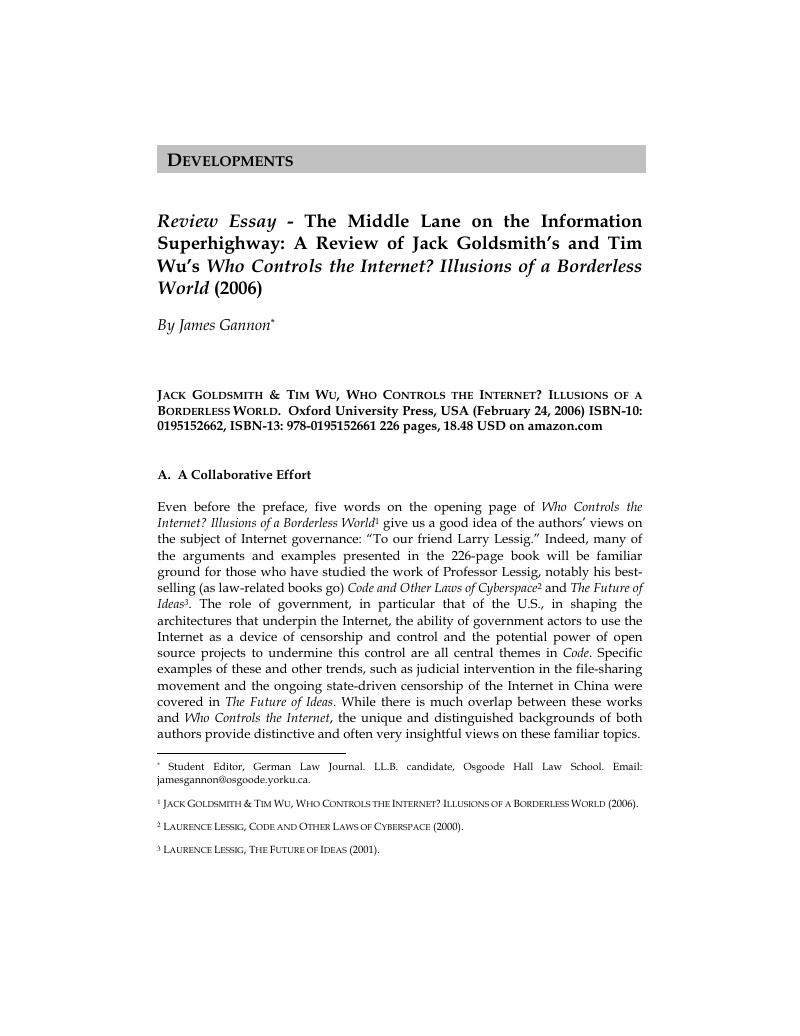Article contents
Review Essay - The Middle Lane on the Information Superhighway: A Review of Jack Goldsmith's and Tim Wu's Who Controls the Internet? Illusions of a Borderless World (2006)
Published online by Cambridge University Press: 06 March 2019
Abstract

- Type
- Developments
- Information
- Copyright
- Copyright © 2007 by German Law Journal GbR
References
1 Jack Goldsmith & Tim Wu, Who Controls the Internet? Illusions of a Borderless World (2006).Google Scholar
2 Laurence Lessig, Code and Other Laws of Cyberspace (2000).Google Scholar
3 Laurence Lessig, The Future of Ideas (2001).Google Scholar
4 Jack Goldsmith & Eric Posner, The Limits of International Law (2005).Google Scholar
5 Goldsmith/Wu, note 1, 5.Google Scholar
6 See the U.S. appeal decision Yahoo!, Inc. v. La Ligue Contra Le Racisme et L'Antisemitisme, 145 F. Supp. 2d 1168 (N. D. Cal. 2001).Google Scholar
7 It should be noted that Yahoo, in a rare act of good sense, removed its auctions of Nazi memorabilia from all their servers, not simply the French. For more information on the Yahoo v. LICRA case see http://www.lapres.net/yahweb.html for an extensive list of news reports and academic and professional articles.Google Scholar
8 Julian Dibbell, A Rape in Cyberspace, or How an Evil Clown, a Haitian Trickster Spirit, Two Wizards, and a Cast of Dozens Turned a Database into a Society, The Village Voice, 21 December 1993, available at http://www.ludd.luth.se/mud/aber/articles/village_voice.html.Google Scholar
9 See, for instance, Lessig, note 2, 3 or Tim Wu, When Code Isn't Law, 89 Virginia Law Review, 2003, where Wu readily admits at 170 that “John Perry Barlow's prophecies, for example, have not been understated”.Google Scholar
10 John Perry Barlow, A Declaration of the Independence of Cyberspace, available at http://homes.eff.org/~barlow/Declaration-Final.html.Google Scholar
11 Goldsmith/Wu, note 1, 27.Google Scholar
12 For an example of a root dot-com address, see the new URL for the University of Virginia Law Review. The UVLR has recently moved to a root address at www.virginialawreview.org, instead of being a sub-URL of the university's website at scs.student.virginia.edu/~lawrev.Google Scholar
13 See, Milton L. Mueller, Ruling the Root. Internet Governance and the Taming of Cyberspace (2002), available at http://mitpress.mit.edu/catalog/item/default.asp?ttype=2&tid=8809.Google Scholar
14 Goldsmith/Wu, note 1, 43.Google Scholar
15 Goldsmith/Wu, note 1, 46.Google Scholar
16 See, in particular, Parts I “Regulability” and II “Regulation by Code.”Google Scholar
17 For a good overview of what is known as the “Great Firewall of China”, see Internet Censorship in the People's Republic of China, available at http://en.wikipedia.org/wiki/Internet_censorship_ in_ mainland_China.Google Scholar
18 See, in this regard, the doctoral dissertation by Vagias Karavas, Digitale Grundrechte: Perspektiven des Verfassungsrechts im Internet (forthcoming 2007), ms. on file with author.Google Scholar
19 Goldsmith/Wu, note 1, 65.Google Scholar
20 Goldsmith/Wu, note 1, “Challenges,” 81-84.Google Scholar
21 Goldsmith/Wu, note 1, 103.Google Scholar
22 Examples include information regarding the SARS outbreak in 2003 circulating among Chinese citizens despite the government's gag policy and the major role of the Internet in movements such as the Orange Revolution in Ukraine in 2004 and the Cedar Revolution in Lebanon in early 2005.Google Scholar
23 Goldsmith/Wu, note 1, 183.Google Scholar
24 Morris Cohen, Property and Sovereignty, 13 Cornell L. Q., 1927.Google Scholar
25 Cohen's position that government control of property is required to maintain an open and competitive marketplace reflects many of the writings that Professor Wu has published with regards to net neutrality. See for instance, Network Neutrality, Broadband Discrimination, 2 J. Telecom. & High Tech 141, 2003.Google Scholar
26 Lawrence Lessig: Free Culture: How Big Media Uses Technology and the Law to Lock Down Culture and Control Creativity (2004).Google Scholar
27 Id., 160: “For contrary to the rhetoric common at the birth of cyberspace that on the Internet, no one knows you're a dog, increasingly, given changing technologies deployed on the Internet, it is easy to find the dog who committed a legal wrong. The technologies of the Internet are open to snoops as well as sharers, and the snoops are increasingly good at tracking down the identity of those who violate the rules.”Google Scholar
28 One quote in particular from Property and Culture would apply quite readily to the undesirable consequences of unregulated powerful private actors on the Internet: “If there is one iota of wisdom in all the religions and philosophies which have supported the human race in the past it is that man cannot live by economic goods alone but needs vision and wisdom to determine what things are worth while and what things it would be better to do without. This profound human need of controlling and moderating our consumptive demands cannot be left to those dominant interest is to stimulate such demands,” note 26, 30.Google Scholar
- 2
- Cited by




